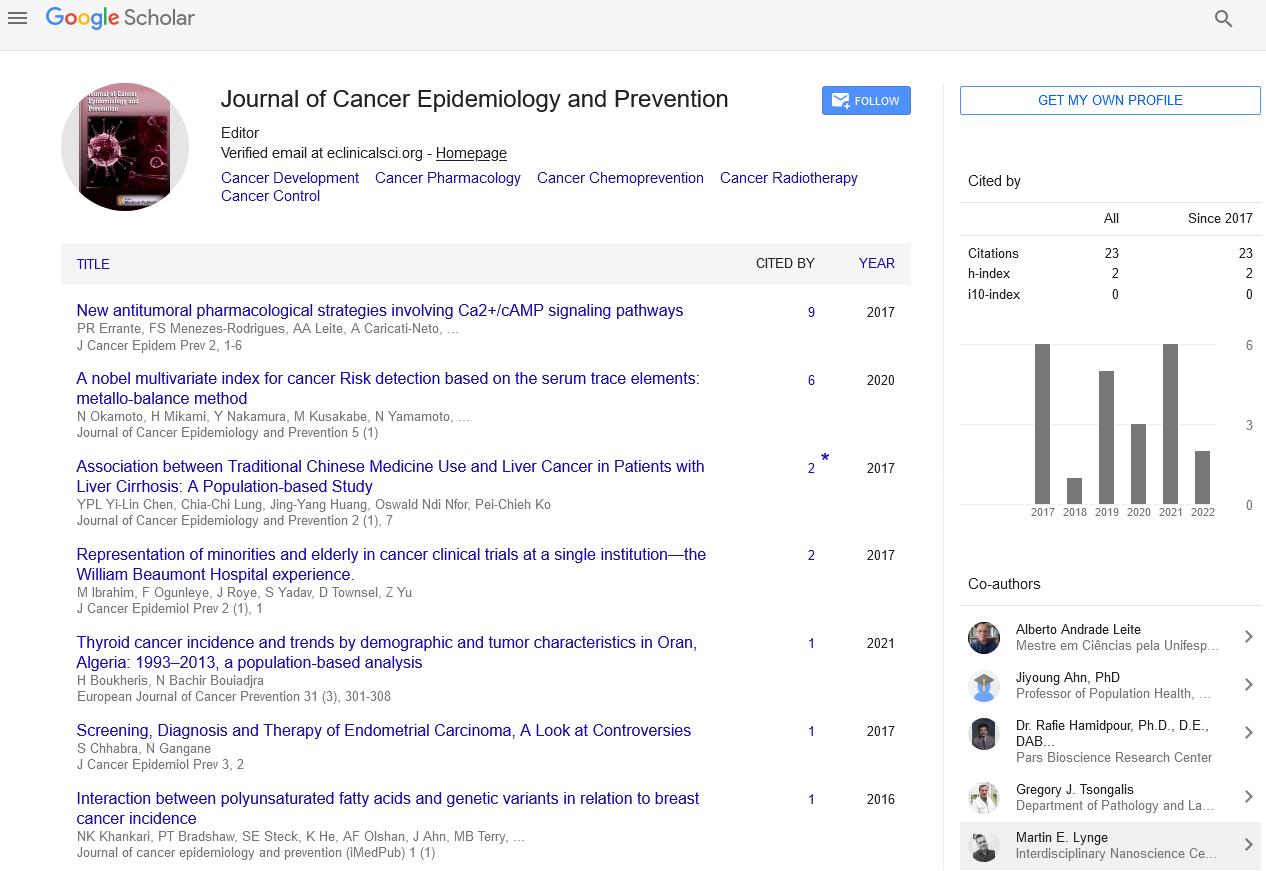Commentary - (2024) Volume 9, Issue 1
The Relationship Between Diet and Cancer: Exploring the Impact of Food Choices on Cancer Risk and Prevention
Joseph Stin*
Department of Food and Nutrition, University of Sydney, Australia
*Correspondence:
Joseph Stin,
Department of Food and Nutrition, University of Sydney,
Australia,
Email:
Received: 28-Feb-2024, Manuscript No. IPJCEP-24-19745;
Editor assigned: 01-Mar-2024, Pre QC No. IPJCEP-24-19745(PQ);
Reviewed: 15-Mar-2024, QC No. IPJCEP-24-19745;
Revised: 20-Mar-2024, Manuscript No. IPJCEP-24-19745(R);
Published:
27-Mar-2024, DOI: 10.36648/IPJCEP.24.09.04
Description
The link between diet and cancer has been a subject of extensive
research over the years. While genetics and environmental
factors play significant roles in cancer development, emerging
evidence suggests that dietary habits also influence cancer risk.
This paper explores the complex relationship between food
choices and cancer, highlighting the role of specific nutrients,
dietary patterns, and lifestyle factors in cancer prevention and
management. Understanding the impact of diet on cancer can
empower individuals to make informed choices that support
their overall health and well-being. Cancer is a leading cause
of morbidity and mortality worldwide, with lifestyle factors
such as diet playing a crucial role in its development and
progression. The foods we consume contain a wide range
of bioactive compounds that can either promote or inhibit
cancer growth. By examining the relationship between diet
and cancer, researchers aim to identify dietary patterns and
specific nutrients that can help reduce cancer risk and improve
outcomes for cancer patients. Nutrients and Food Components:
Several nutrients and food components have been studied
for their potential effects on cancer risk: Antioxidants: Found
in fruits, vegetables, and whole grains, antioxidants such as
vitamins C and E, beta-carotene, and selenium help neutralize
harmful free radicals that can damage cells and contribute
to cancer development. Fiber: High-fiber foods like fruits,
vegetables, and whole grains have been associated with a
reduced risk of colorectal cancer. Fiber helps promote healthy
digestion and may also play a role in regulating hormone levels
and reducing inflammation. Phytochemicals: Phytochemicals
are bioactive compounds found in plant-based foods that
have been shown to possess anti-cancer properties. Examples
include polyphenols in tea and berries, lycopene in tomatoes,
and sulforaphane in cruciferous vegetables like broccoli
and kale. Omega-3 fatty acids: Found in fatty fish, flaxseeds,
and walnuts, omega-3 fatty acids have anti-inflammatory
properties that may help reduce the risk of certain cancers,
including breast and prostate cancer. Red and processed
meats: Consumption of red and processed meats has been
linked to an increased risk of colorectal and other cancers.
Processed meats contain additives such as nitrates and nitrites,
which can form carcinogenic compounds when cooked at high
temperatures. Dietary Patterns and Cancer Risk: In addition to
individual nutrients, overall dietary patterns also play a crucial
role in cancer prevention: Mediterranean diet: Rich in fruits,
vegetables, whole grains, olive oil, and fish, the Mediterranean
diet has been associated with a lower risk of various cancers,
including breast, colorectal, and prostate cancer. Plant-based
diet: Diets that emphasize plant-based foods while limiting or
avoiding animal products have been linked to a reduced risk of
cancer, possibly due to their high fiber and antioxidant content.
Western diet: Conversely, the Western diet, characterized by
high consumption of red and processed meats, sugary snacks,
and processed foods, has been associated with an increased
risk of cancer, as well as other chronic diseases like obesity
and heart disease. Lifestyle Factors and Cancer Prevention: In
addition to diet, other lifestyle factors also influence cancer
risk: Physical activity: Regular physical activity has been shown
to reduce the risk of certain cancers, including breast, colon,
and endometrial cancer. Exercise helps maintain a healthy
weight, improves immune function, and regulates hormone
levels. Alcohol consumption: Excessive alcohol consumption is
a known risk factor for several cancers, including those of the
breast, liver, and esophagus. Limiting alcohol intake can help
reduce cancer risk. The relationship between diet and cancer is
complex, with various nutrients, dietary patterns, and lifestyle
factors influencing cancer risk and progression.
Acknowledgement
None.
Conflict Of Interest
None.
Citation: Stin J (2024) The Relationship between Diet and Cancer: Exploring the Impact of Food Choices on Cancer Risk and Prevention. J Cancer Epidemiol. 9:04.
Copyright: © 2024 Stin J. This is an open-access article distributed under the terms of the Creative Commons Attribution License, which permits unrestricted use, distribution, and reproduction in any medium, provided the original author and source are credited.

